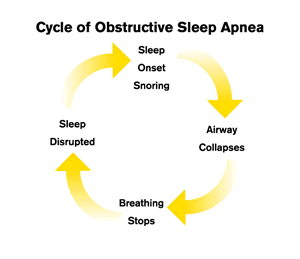What is Sleep Apnea?
 Sleep Apnea is a medical condition characterized by periods of cessation of breathing throughout the night. Typically, sleep apnea occurs as a result of an obstruction in the flow of oxygen, often due to the size of the tongue and/or jaw. Depending on the type of sleep apnea, the condition may affect the throat muscles or extend to the nervous system. While there are a variety of indicators, oral symptoms are very common, and thus, dentists have become critical in diagnosing this condition.
Sleep Apnea is a medical condition characterized by periods of cessation of breathing throughout the night. Typically, sleep apnea occurs as a result of an obstruction in the flow of oxygen, often due to the size of the tongue and/or jaw. Depending on the type of sleep apnea, the condition may affect the throat muscles or extend to the nervous system. While there are a variety of indicators, oral symptoms are very common, and thus, dentists have become critical in diagnosing this condition.
Signs of Sleep Apnea
Some of the most common signs of sleep apnea include, but are not limited to:
- Headaches
- Insomnia
- Excessive snoring
- Constant fatigue
- Sore throat
In addition to these signs, there are oral signs that are often indicative of sleep apnea. Some oral signs include dry mouth, worn down teeth due to frequent grinding, and most importantly, jaw pain. For an individual with sleep apnea, the relaxation of the throat muscles triggers the jaw to tighten up. As a result, the stress placed on the jaw causes significant pain. A patient reporting prolonged jaw pain may have sleep apnea and/or TMJ.
Treating Sleep Apnea
Perhaps the most common and least invasive way to treat sleep apnea is by using a CPAP machine. This machine is designed to maintain constant air pressure so that the airway does not become obstructed. However, this machine can be very noisy and disruptive, especially to those who are light sleepers. This is not the only treatment option, though. Other options include surgery or oral devices. Oral devices may provide extra assistance to the jaw and prevent further damage from teeth grinding.
How Park Avenue Dental Can Help
Because sleep apnea presents with many oral symptoms, dentists have been able to assist with diagnosing sleep apnea. If you are experiencing any of these symptoms or believe you may have sleep apnea, give us a call today. Our team will happily schedule an appointment to assess any symptoms and discuss oral treatment options!
